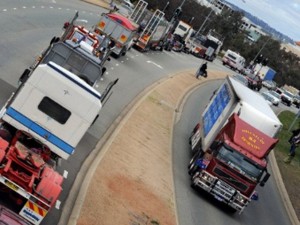Australia brings in contentious carbon tax

The anti-carbon tax protest known as The Convoy of No Confidence encircles the Parliament House ring road in Canberra on August 22, 2011. The national convoy of disgruntled Australian truck drivers and farmers descended on Canberra to protest government policies including plans for a pollution tax. AFP FILE PHOTO
Sydney – Australia Sunday introduced a controversial carbon tax in a bid to tackle climate change, with Prime Minister Julia Gillard hailing the move amid opposition warnings it will stifle industry.
The tax on corporate pollution, which led to demonstrations across the vast nation, will force about 350 major polluters to pay Aus$23 (US$23.5) for every tonne of carbon they produce.
It comes into effect on the same day as an equally contentious levy on mining profits, the hard-fought Mineral Resource Rent Tax on iron ore and coal which helped topple former prime minister Kevin Rudd.
But Gillard hailed the introduction of the carbon tax in Australia, one of the world’s worst per capita polluters.
“Our nation’s been involved in a debate now for many long years about putting a price on carbon and tackling climate change, and we have got this done,” Gillard told the Australian Broadcasting Corporation.
“Yes, with a fixed price, a carbon tax if you like for the first three years, and then with an emissions trading scheme to follow.”
The government hopes the scheme will mean that by 2020, Australia’s carbon pollution will be at least 159 million tonnes less per year than it would be otherwise – the equivalent, it says, of taking 45 million cars off the road.
The plan is for it to transition to a market-based emissions trading scheme after three years.
But the tax has been bitterly opposed by the conservative opposition, which argues it will see the cost of living soar and hurt industry, and have vowed to repeal it if they win office in the 2013 elections.
“(The carbon tax) is the slow boa constrictor sapping life out of one business after another,” opposition lawmaker Warren Truss, leader of the Nationals, told the ABC.
Gillard said future governments would have difficulty scrapping the tax, which is helping to fund other benefits for families.
“As a Labor government, we haven’t done all of this for no reason, we’ve done it because we believe it’s pivotal to Australia’s future,” she told the ABC program Insiders.
“Today is a Sunday where Australians will go about their ordinary lives, but today is day too when we seize the future, we seize a clean energy future.”